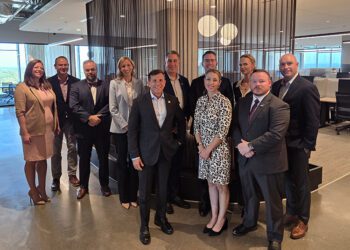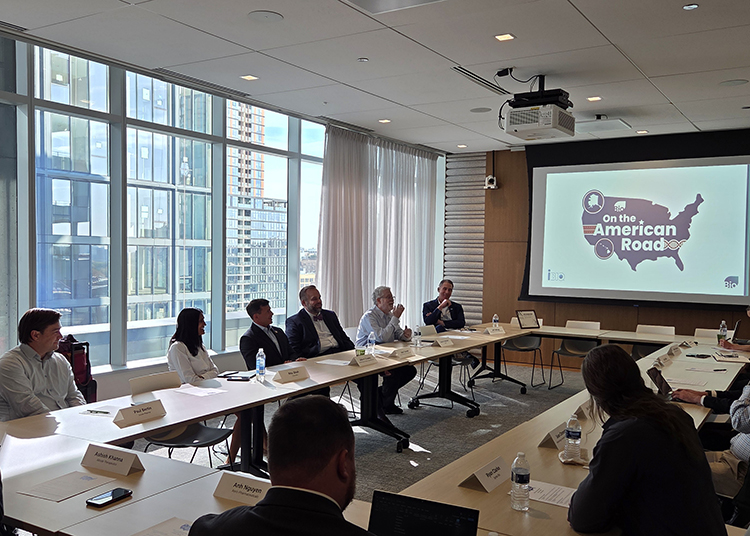A concentration of scientific expertise, extensive manufacturing activity, and state support have helped make biotech one of the fastest-growing areas of employment in Illinois.
“The life sciences industry in Illinois currently employs 93,402 workers earning an average of $153,000; these jobs are growing at 20 times the rate of Illinois’ overall private sector since 2019, at 7.5% annually,” according to a report by iBIO.
But as an Oct. 2 Biotechnology Innovation Organization (BIO) visit to the state revealed, the benefits of this growth are not only economic: Exciting innovations in science, and policy, are helping to forward the development of treatments patients need.
BIO President & CEO John F. Crowley led this latest leg of the BIO on the American Road tour—visits around the country to learn more about the needs and unique features of the country’s biotech ecosystems.
The visit included a listening session, with a dozen CEOs from biotech firms around the region and the head of Northwestern University’s Innovation and News Ventures Office. When it comes to building a strong biotech sector, Crowley told the session, the most successful regions decide: “We want to win in biotech.”
Throughout the BIO visit, Crowley learned what Illinois is doing to win.
Public and private investment
The state of Illinois’ efforts to support its biotech ecosystem include beneficial programs that have been backed by iBIO the Illinois biotech association that is a local affiliate of BIO.
“Gov. J.B. Pritzker, who is now in his second term, has released two economic development plans for the state of Illinois that align resources with the needs of biotech,” said iBIO President and CEO John Conrad, who helped organize BIO’s visit.
Gov. Pritzker’s five-year economic growth program published in 2024 includes tax incentives for R&D, support for biotech education, infrastructure development, support for startups, and efforts to streamline regulation of clinical trials and product approvals, Conrad noted.
“Also under Gov. Pritzker, iBIO helped develop a proposal and worked with our legislature to pass a SBIR (Small Business Innovation Research) matching program for the state of Illinois,” Conrad said. “Illinois now matches the federal SBIR grants that our member companies are receiving.”
iBIO also assisted Illinois’s efforts to establish a state-managed venture fund that invests in innovative startups. “We provided that model for the Department of Commerce, and they were able to launch the program Illinois INVENT,” Conrad said.
Along with state-funded venture capital, Illinois is home to a lot of private VC. This investment is highlighted in the iBIO report, which outlined $1.24 billion in total investment going to 99 life sciences companies in 2024.
A revolutionary approach to autoimmune disease
One recent recipient of major funding in the region, COUR in Evanston, IL, was the first big stop on Crowley’s tour.

COUR”s revolutionary platform is designed to enable treatments for a variety autoimmune diseases. Recognizing the potential of the platform, Genentech recently signed a collaboration agreement worth approximately $940 million with COUR.
In Evanston, Crowley met with COUR’s leadership, including CEO Dannielle Appelhans, as well as a representative of the Illinois Department of Commerce and Economic Opportunity, and iBIO’s Conrad. The group discussed the venture capital environment, workforce development, and the benefits of COUR’s new location, abutting Northwestern University, for attracting talent.
They also discussed small biotech’s need for the right infrastructure, including facilities with special utilities—such as air handling and unusual water requirements—to facilitate research and manufacturing.
COUR’s platform uses technology that has been under development at Chicago’s Northwestern University for more than 30 years. It offers the promise of rapidly providing new treatments for a variety of diseases, much as mRNA opened the possibility of rapid development, according to Paul Peloso, MD, the CMO of COUR.
The goal of the treatments is to teach the body to tolerate its own harmless proteins.
“Every day we have about a billion cells that are broken down in the body, and these cells, called apoptotic bodies, just need to be cleared,” Peloso explained. “What can happen is a viral infection modifies the normal immune response so that things that are part of us are now identified as non-self. And the body has an autoimmune response: it starts reacting in abnormal ways to its own proteins.”
The new technology introduces disease-spurring antigens with a nanoparticle that is the right size, 500 nanometers, and the right charge, negative, to make it recognizable to the body.
“So the negative charges and the size are two things that alert the body that this is just normal cellular debris that needs to be managed,” Peloso said. “We present it back in the way that the body understands it, and we retrain the body to say, ‘Hey, I don’t need to react to this little bit of protein.’”
One advantage of the tolerance treatments produced by the COUR platform is that they offer the promise of ending the disease without the need for chronic immunosuppressive therapies. “When you talk to patients, they immediately get this. That’s really the promise of tolerance,” Peloso said.
A bustling ecosystem
COUR’s technology is Chicago born and bred.
“It all began when Dr. Stephen Miller was giving a lecture at Northwestern about delivering some of these antigens to the body in a way to retrain it. And at the lecture was a biomechanical engineer, Dr. Lonnie Shea, who said, ‘You can deliver the antigens in these particles that I’ve been working with.’ They began working together and they created this technology,” said Peloso.
The manufacturing of COUR’s therapies is also local, according to Peloso. Given the complexities involved, he explained, the company has found it best to do their own manufacturing, rather than involving CDMOs, and they have the capacity to scale up production to a commercial level.
As Conrad noted, the Illinois biotech ecosystem includes large pharma companies with manufacturing facilities, such as AbbVie and Astellas, Takeda, and CSL Behring. Research facilities in Chicago include a cluster of four buildings that have helped the city add 2 million square feet of lab space since 2020, Conrad said.
For universities, Northwestern, University of Chicago, and University of Illinois are “the big three,” and they now collaborate on new technologies to understand inflammation and the immune system in the CZ bio hub in Chicago, the second location chosen for such a hub by the Chan Zuckerberg Foundation. Another major research university is “Illinois Tech, which is our technical college here, kind of like an MIT,” Conrad said.
Patient advocacy
As usual, an important part of Crowley’s visit was dedicated to patient advocates.
Conrad noted that Illinois has taken a lead in patient support with legislation to require that insurers provide coverage for the biomarker testing that is an essential part of providing personalized medicine. “We’re the first state that passed a biomarkers bill in the country,” he said.
During BIO’s Illinois visit, Crowley met with Amy and Pat Tomasulo, whose efforts to raise funds and awareness for trigeminal neuralgia, a rare form of extreme facial pain, resulted in the creation of the Facial Pain Research Foundation (FPRF). Amy Tomasulo has been living with trigeminal neuralgia for several years.
About 150,000 people in the U.S. receive a trigeminal neuralgia diagnosis every year. Females are more likely to develop it than males, and most cases develop after age 50.
In their meeting with Crowley, the couple and their medical advisors discussed how their organization has grown to a size where they are exploring providing seed funding to support new companies that are seeking treatments.
“They’re at a good inflection point, having more of an impact,” Conrad said of FPRF. “I think John is always a strong advocate for the patient community, so having him meet with patient groups that are really becoming effective for their community is important.”
Just as the importance of biotech is growing for the state’s employment, the ability of Illinois patient advocates to support biotech is growing too.




